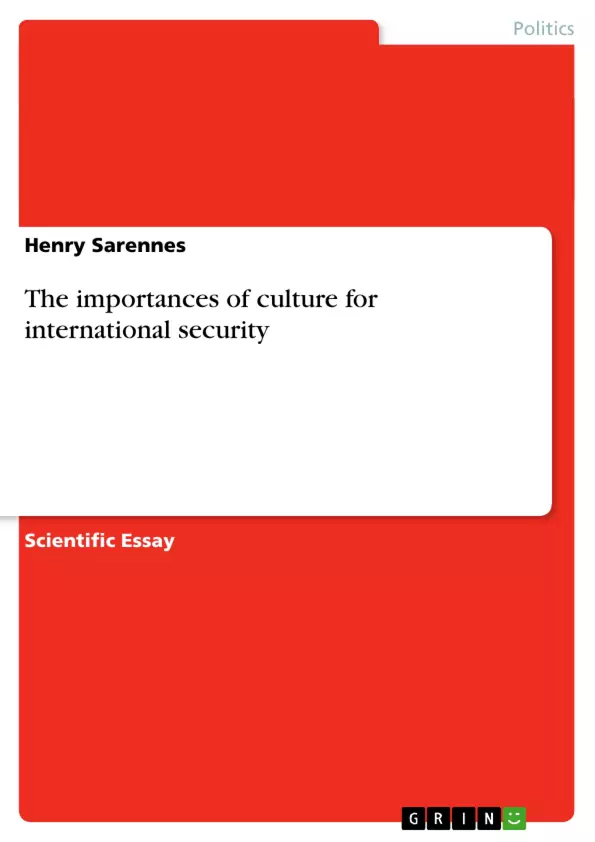Over the past few decades, political scientists have extensively pondered on the various theories that describe, suggest or reflect the nature of international security. Some are encouraging and ambitious, others firmly pessimistic, and with a few exceptions, all are often too abstract from contemporary and relevant practices and viewpoints. Such theories have too often steered away from the relevant factors needed for the establishment of international peace and security. The rise of certain doctrines, most often in the form of nationalist ideologies, have been met with the suppression of highly important elements that are used to define social groups, culture being one of them.
Even though the term 'culture' can be broadly defined, in this context it is a reference to the unavoidable social diversity among the world population in terms of social norms, practices, traditions, ideologies etc. Social theorists such as constructivists would argue that the human factor is very often disregarded when creating and implementing decisions that concern multiple social groups. The issue of uncertainty is an example of the problems posed by the clash of different cultures as well as the limited research and education (social-wise) that plagues such conflicts.
Inhaltsverzeichnis (Table of Contents)
- INTRODUCTION
- DISCUSSION
- CONCLUSION
Zielsetzung und Themenschwerpunkte (Objectives and Key Themes)
This essay aims to explore the significance of culture in achieving international security. It challenges conventional theories, arguing that the human factor, particularly cultural diversity, is often overlooked in security discussions. The essay highlights the need to embrace a more nuanced understanding of culture and its influence on international relations.
- The role of culture in international security
- The challenges posed by cultural diversity
- The importance of unity and tolerance in a diverse world
- The limitations of traditional security theories
- The potential benefits of embracing cultural diversity for global peace
Zusammenfassung der Kapitel (Chapter Summaries)
The INTRODUCTION sets the stage by critiquing existing international security theories for neglecting the impact of culture. The essay posits that a more comprehensive understanding of cultural diversity is essential for building a secure and peaceful world. It defines culture broadly, encompassing social norms, practices, traditions, and ideologies.
The DISCUSSION delves deeper into the implications of cultural diversity for international relations. It argues that ignoring cultural differences can lead to misunderstandings and conflict, citing the Cold War as an example. The essay further emphasizes the importance of considering cultural contexts when addressing conflicts and promoting peace. It also acknowledges the criticisms of the cultural approach to security, while defending its value in grounding theoretical analysis in empirical observation.
The CONCLUSION emphasizes the potential of cultural diversity as a source of strength for international security. It envisions a world where cultural differences are not perceived as a threat, but rather as an opportunity for greater understanding and cooperation. The essay suggests that embracing cultural diversity can lead to more inclusive and equitable international decision-making.
Schlüsselwörter (Keywords)
The essay explores the role of culture in international security, emphasizing the importance of understanding cultural diversity, unity, tolerance, and the limitations of traditional security theories in a globalized world. The author delves into key concepts like cultural differences, cultural clashes, and the potential of cultural diversity for achieving international peace.
Frequently Asked Questions
How does culture affect international security?
Culture defines social groups through norms, traditions, and ideologies. Ignoring these cultural factors can lead to misunderstandings, uncertainty, and clashes between different social groups, impacting global peace.
What is the main criticism of traditional international security theories in this essay?
The essay argues that traditional theories are often too abstract and disregard the "human factor," specifically the unavoidable social and cultural diversity of the world population.
How is 'culture' defined in the context of international relations?
In this context, culture refers to social diversity in terms of norms, practices, traditions, and ideologies that define various social groups globally.
What role does cultural diversity play in achieving global peace?
The essay suggests that embracing cultural diversity can be a source of strength, leading to more inclusive decision-making, tolerance, and cooperation rather than being perceived as a threat.
What are the potential consequences of ignoring cultural differences?
Ignoring culture can lead to the rise of nationalist ideologies, suppression of social identity, and conflicts rooted in uncertainty and a lack of social research.
- Quote paper
- Henry Sarennes (Author), 2011, The importances of culture for international security, Munich, GRIN Verlag, https://www.grin.com/document/263079



